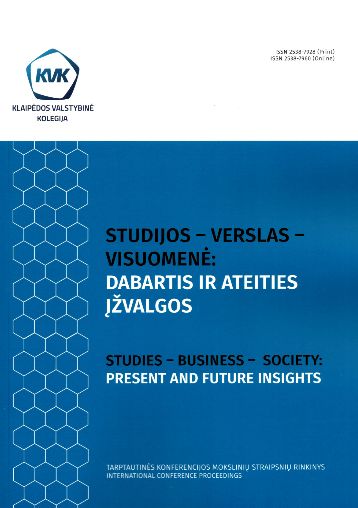REDUCTION OF NEGATIVE EFFECTS ON THE ENVIRONMENT IN MARINE TRANSPORT
DOI:
https://doi.org/10.52320/svv.v1iVII.249Keywords:
maritime transport, environmental impact, ballast waterAbstract
Considering that shipping is part of the cross-border logistics chain, it is important to go green when transporting goods internationally. As maritime transport is important for global and European trade and economy, the maritime transport sector has taken important measures in recent years to reduce its negative impact on the environment.
As the amount of cargo increased internationally, and ships moved more intensively, water pollution became more and more relevant, which is also important for Klaipėda, because it is located on the Baltic Sea. It was found that 46 non-native species have appeared in the Baltic Sea region since 2000, of which only 13 were primary interventions of non-native species
At present, the market offers a selection of 95 approved combinations of BWTr equipment, the capacity of which ranges from 17,5 to 34 000 m3 /h. Combined filtration and UV irradiation technologies are offered by 22 manufacturers, filtration and electrochlorination technologies — by eight, and seven propose filtration and electrolysis technologies (Latest Information of Approval of Ballast Water Management System, 2019). The choice of BWTr equipment poses the problem regarding the rationality of ballast water treatment technology or their combination for a newly constructed or already exiting ship; the negative impact of the selected technology on the structure of the ballast system of the ship; and technical parameters and performance indicators to be considered when making a choice, therefore, we can raise a problematic question: what innovative technologies would allow maritime transport to reduce water pollution and transport cargo more sustainably?
The subject of the study is reducing the negative environmental impact of maritime transport.
The purpose of the study is to review the possibilities of reducing negative environmental impacts in maritime transport.
Tasks:
- To reveal the negative impact of ships' ballast water on the environment.
- To identify technologies for cleaning ballast water.
Research methods: analysis of scientific literature; methods of analysis, comparison, summarization of normative acts; analysis of regulations of ship classification societies; method of alternatives; analytical and statistical methods of data analysis and systematization.
The article reveals the facts of the negative environmental impact of ships' ballast water during the transportation of goods by sea. By applying innovative technologies, preventive measures have been identified, with the help of which it is planned to stop ecological pollution with ships' ballast waters, in accordance with the implementation of the International Convention on the Control and Management of Ships' Ballast Waters and Sediments.
The installation of ballast water treatment equipment on ships is the only way to prevent the proliferation of invasive species. The International Maritime Organization sets out the requirements for the quality of treatment and so far has approved 95 combinations of ballast water treatment equipment using about 20 different treatment technologies. The most widely used ballast water treatment technologies have been identified: mechanical cleaning (filtration, hydrocyclonic separation), physical disinfection (UV radiation, deoxidation, cavitation), chemical disinfection (ozonation, electrolysis, disinfection with oxides and dioxides). In order for the treated ballast water discharged overboard to meet the quality requirements of the IMO, several technologies are combined on board the ships. Scientists and manufacturers are developing new ballast water treatment technologies with the aim of making ballast water treatment technologies inexpensive, the equipment used compact, fast and high-quality cleaning, and its installation and use cheap and safe.
Downloads
Published
How to Cite
Issue
Section
License
Copyright (c) 2022 Ilvija Pikturnaitė; Diana Šateikienė

This work is licensed under a Creative Commons Attribution 4.0 International License.
Individual articles are published Open Access under the Creative Commons Licence CC-BY 4.0, which permits unrestricted use, distribution, and reproduction in any medium, provided the original author and source are credited. Authors retain copyright in their articles, but grant Klaipėdos valstybinė kolegija the right of the first publication.

